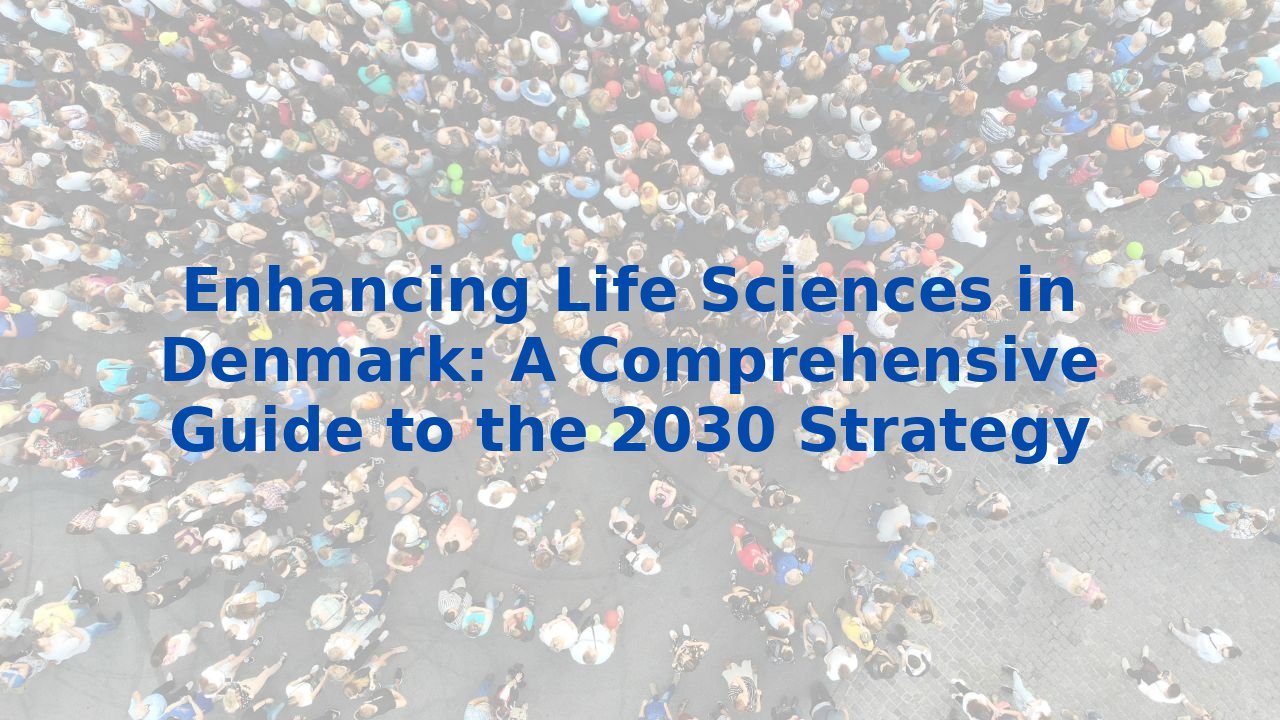Enhancing Life Sciences in Denmark: A Comprehensive Guide to the 2030 Strategy
Enhancing Life Sciences in Denmark: A Comprehensive Guide to the 2030 Strategy
Introduction
The life sciences industry stands as a critical pillar of modern healthcare, propelling innovation and fostering economic growth. With its illustrious track record, Denmark is setting the stage to emerge as a leading life science nation in Europe with the new 2030 strategy. This comprehensive initiative revolves around six pivotal focus areas: a stronger growth layer, strengthened research efforts, improved uptake of innovation, attractive conditions for business, international cooperation, and joint initiatives for sector development. In this blog post, we will explore these focus areas and highlight how artificial intelligence (AI) can enhance processes to cultivate organizational efficiency in the life sciences sector.
1. A Stronger Growth Layer
The initial focus of the strategy is to create a dynamic environment for up-and-coming life science ventures. This includes enhancing access to venture capital while fostering partnerships among research institutions, healthcare providers, and private companies. AI plays a vital role by:
- Predictive Analytics: Leveraging AI algorithms to analyze trends, patient data, and clinical outcomes, organizations can identify areas ripe for investment.
- Automated Decision-Making: AI tools streamline evaluation processes for startup proposals, saving valuable time and resources.
- Data-Driven Insights: Companies utilizing machine learning can derive actionable insights into customer needs and market dynamics, fostering informed decision-making.
2. Strengthened Research and Better Use of Health Data
This initiative underscores the necessity for enhanced clinical research and the integration of AI within healthcare. AI can be transformative in this domain by:
- Data Integration: AI facilitates the amalgamation of expansive health data sources into a unified database, optimizing research efforts.
- Clinical Trial Optimization: By optimizing trial designs and patient selection, AI significantly reduces costs and improves outcomes in clinical research.
- Personalized Medicine: AI's capacity to analyze patient data enables tailored treatments, boosting efficacy and patient satisfaction.
3. Better Uptake of Innovation in the Healthcare System
Recognizing the importance of innovative healthcare solutions, this initiative aims to expedite the adoption of cutting-edge technologies. AI enhances this process through:
- Digital Health Solutions: AI-powered solutions offer real-time patient monitoring, fostering personalized care that promotes better outcomes.
- Efficiency Gains: Automating administrative tasks through AI allows healthcare professionals to dedicate more time to patient care.
- Training and Education: AI-driven training programs can keep medical personnel abreast of the latest innovations, ensuring a seamless integration of new technologies.
4. Attractive Framework Conditions and More Foreign Investment
This initiative focuses on positioning Denmark as an appealing production hub by minimizing bureaucratic challenges and streamlining the establishment of new production capacities. AI can contribute to this goal by:
- Automated Permit Processes: Automating applications for permits simplifies the complex landscape of regulatory compliance.
- Predictive Maintenance: AI analyzes production data to foresee maintenance needs, maintaining steady operations.
- Workforce Optimization: Analyzing skill sets and resource allocation through AI ensures the right talent is available when needed.
5. International Cooperation and Health Diplomacy
Denmark recognizes the power of global partnerships in addressing health challenges. AI enhances international cooperation by:
- Global Data Sharing: AI fosters secure and efficient sharing of data across borders, enriching collaborative research.
- Real-Time Monitoring: AI systems actively monitor health trends worldwide, enabling timely responses to health crises.
- Healthcare Solutions Export: Innovating and exporting healthcare solutions can elevate Denmark’s position globally.
6. Joint Efforts for the Development of the Life Science Sector
This focus area emphasizes collaboration among government, industry, and research institutions to advance the life sciences agenda. AI bolsters these joint efforts by:
- Data-Driven Decision-Making: AI analyzes data from various stakeholders, enabling well-informed strategic decisions across sectors.
- Innovation Hubs: Establishing innovation hubs can amplify collaboration among research and industry experts, fostering breakthroughs.
- Training and Development: Equipping employees with AI skills promotes adaptability and innovation within organizations.
Benefits of Training Employees for AI
While AI enhances processes, the potential of such technologies can only be fully realized when employees are proficient in their utilization. Investing in training programs can offer numerous benefits:
- Enhanced Skills: Employees gain a deeper understanding of AI tools, which in turn boosts productivity and decision-making capabilities.
- Adaptability: In an era of rapid technological change, trained employees are better prepared to adapt to evolving systems.
- Innovation Culture: A culture of continuous improvement emerges when employees actively engage in learning and development.
Conclusion
The Danish Life Sciences Strategy 2030 is not just a plan, but a vision that aims to cement Denmark’s reputation as a leader in the life sciences domain. With AI integrated into the key focus areas, this strategy lays the groundwork for significant efficiency, innovation, and collaboration increases in the sector. Moreover, committing to employee training ensures that the workforce is equipped to navigate this transformative landscape effectively, paving the way for robust advancements in global health.



